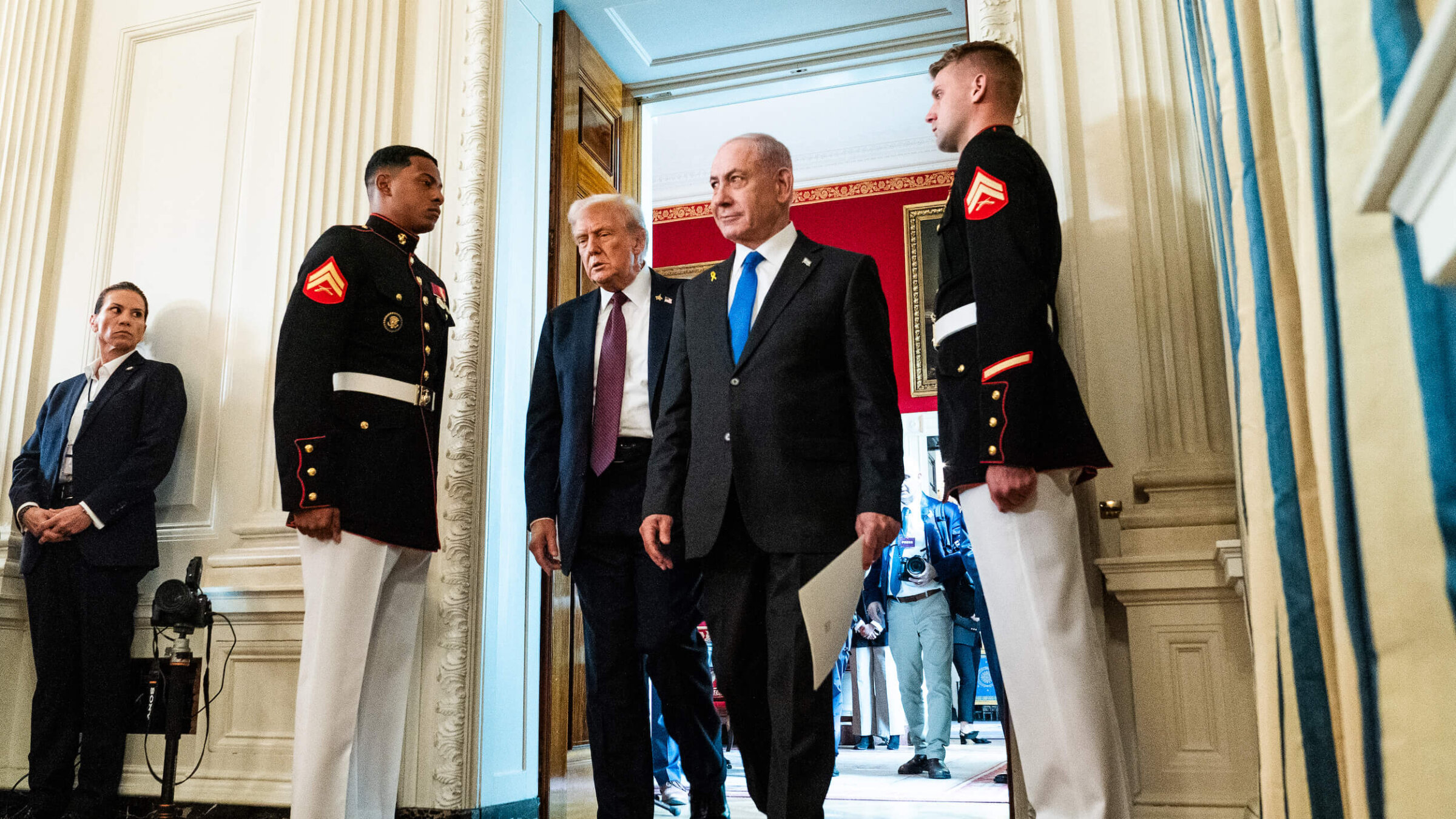The answered prayers of Trump’s artful ceasefire deal
Trump muscled Israel and Hamas into agreement. Now he must make it stick.

President Donald Trump and Israeli Prime Minister Benjamin Netanyahu at the White House on Sept. 29, 2025. Photo by Demetrius Freeman/The Washington Post via Getty Images
On Yom Kippur, millions of Jews around the world prayed for the release of the hostages. A week later, those prayers are on the verge of being answered.
President Donald Trump’s announcement Wednesday evening that Hamas and Israel have accepted the first phase of his peace deal — including the release of all the living hostages at once, likely this weekend, in exchange for Palestinian prisoners — is as shocking as it is wonderful.
Just over two years since Oct. 7, 2023, when Hamas invaded Israel, killing almost 1,200 people and abducting 251, there has been scant good news. As the death toll has mounted on both sides, we’ve had little reason to expect anything except for more bloodshed, more vengeance and more destruction.
“History teaches us that men and nations behave wisely once they have exhausted all other alternatives,” the late Israeli diplomat Abba Eban once said — and Trump saw that Israel and Hamas were both exhausted, with no alternatives.
Israel faced mounting domestic unrest, a steep decline in international support as its allies lined up to back a Palestinian state, cultural and diplomatic isolation, and a war-weary military.
Hamas lost every battle but the one it started on Oct. 7, and found itself cornered in Gaza City without the weapons lifeline of Iran and the cash infusions from Qatar. Hamas had also lost popular support. After Oct. 7, 71% of Palestinians said they supported the attack. In a May 2025 poll, that number was 51%. Support for Hamas among all Palestinians has dropped to 32% from 43% in December 2023.
The outline of the current deal is similar to one President Joe Biden offered a year ago. What’s different: Trump understood that both parties were at the end of the road, and used that knowledge wisely.
He increased American leverage over Hamas by bringing Qatar closer than ever into the United States’ embrace. Skeptics said that part of that closeness came from the economic ties between Qatar and the Trump family and its associates. If that’s what brings the hostages home, I’m frankly not sure I care.
At the same time, Trump finally stood up to Israeli Prime Minister Benjamin Netanyahu. According to news reports, he lost his temper with Netanyahu following Israel’s September assassination attempt against Hamas leaders in Doha, Qatar. That shocking expansion of the war threatened the Abraham Accords, the singular diplomatic achievement of Trump’s first term, as well as direct U.S. interests: Qatar hosts the largest American air base in the Middle East.
The first clue that Trump’s deal might really come through, after so many failed efforts to secure a lasting ceasefire, was that Trump successfully forced Netanyahu to make a personal apology to Qatar last week — something almost unprecedented in Middle East diplomacy. He then extended the promise of a NATO-like American defense shield to Qatar, also unprecedented.
All that maneuvering has led to an agreement that, if it holds, will be a stunning victory against extremism.
Hamas and other Palestinian militant groups have reaped the fruits of violent resistance. Could they be more rotten and bitter?
Far-right Israeli leaders and their supporters who fantasized about reoccupying Gaza — which would’ve been almost inconceivable without consigning the remaining hostages to death — will not get their way. “I said, ‘Israel cannot fight the world Bibi, they can’t fight the world,’” Trump said.
And the longer-term implications of Trump’s plan provide a pathway to peaceful coexistence between Israelis and Palestinians, which would almost certainly deprive those same Israelis and their supporters of dominion over the West Bank and the almost 2 million Palestinians who live there.
The deal is a blow to extremists outside the region as well — those online social media warriors who have been trashing the deal, eager to fight the Zionist entity into nonexistence. The prospect of peace and coexistence must be a huge disappointment for them.
“Let it be known that Western leftists who oppose the ceasefire plan in Gaza are now more radical and rigged than Hamas itself,” wrote Palestinian activist Khalil Sayegh last week. “Hamas sounds reasonable compared to the keyboard warriors in the West.”
For the rest of us, the deal is a giant leap in the right direction.
In January, when Trump oversaw a deal to release 33 hostages with the same promise of a long-term Israeli-Palestinian accord, I wrote that if it came to pass, I would be the first in line to hang the Nobel medal around his neck. I still think he is a clear and present danger to democracy in the U.S. and to the well-being of the most vulnerable Americans, as the current government shutdown makes clear.
But credit where credit is due. This is an artful deal, one that returns hope to a region where it had all but disappeared.
The last deal fell apart when Netanyahu refused to enter the second phase of negotiations. This one has more of the necessary threats and benefits behind it to keep all the parties in line. Here’s praying it holds — for the hostages, for Israelis and Palestinians, and for the world.
















